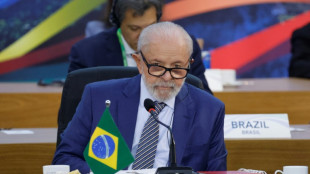
-
 Taiwan says detects 16 Chinese warships around island
Taiwan says detects 16 Chinese warships around island
-
Asian markets fluctuate after Wall St record; eyes on China

-
 Vulnerable Afghans struggle as Taliban rebuild Kabul roads
Vulnerable Afghans struggle as Taliban rebuild Kabul roads
-
Amid weak eurozone and political turmoil, ECB to cut rates again

-
 South Korea's Yoon vows to fight 'until the very last minute'
South Korea's Yoon vows to fight 'until the very last minute'
-
Australia to spend $385 mn on PNG rugby league team with eye on China

-
 Health insurers: the 800-pound gorilla in profit-driven US system
Health insurers: the 800-pound gorilla in profit-driven US system
-
Pope to champion popular Catholic traditions in Corsica

-
 Lithium-rich Bolivia lags behind in race to mine key metal
Lithium-rich Bolivia lags behind in race to mine key metal
-
Video game bosses gather at 'darkest hour' for industry

-
 Belichick inks deal to coach US college team
Belichick inks deal to coach US college team
-
Belichick inks deal to coach US college team: report

-
 UN General Assembly calls for 'unconditional' Gaza ceasefire
UN General Assembly calls for 'unconditional' Gaza ceasefire
-
Dortmund fear 'worst-case scenario' after Schlotterbeck injury

-
 Juve deepen Man City crisis, Barcelona into Champions League knockouts
Juve deepen Man City crisis, Barcelona into Champions League knockouts
-
'Incredible' Saka makes the difference for Arsenal: Arteta

-
 'We want more', says Olmo with Barcelona bound for knock-outs
'We want more', says Olmo with Barcelona bound for knock-outs
-
Guardiola 'questioning self' after latest City loss at Juve

-
 Nasdaq surges above 20,000 after US inflation data matches estimates
Nasdaq surges above 20,000 after US inflation data matches estimates
-
Torres sinks Dortmund to send Barcelona into knockouts

-
 UN General Assembly calls for 'unconditional' ceasefire in Gaza
UN General Assembly calls for 'unconditional' ceasefire in Gaza
-
US House passes defense bill banning gender care for minors

-
 Turkey says Ethiopia, Somalia reach compromise deal to end feud
Turkey says Ethiopia, Somalia reach compromise deal to end feud
-
Saka brace sinks Monaco as Arsenal eye Champions League last 16

-
 Man City crisis deepens with Champions League defeat at Juventus
Man City crisis deepens with Champions League defeat at Juventus
-
Ashworth exit 'not the best' for Man Utd says Amorim

-
 Romero sorry over Spurs transfer jibe: Postecoglou
Romero sorry over Spurs transfer jibe: Postecoglou
-
Lula to undergo new operation to 'minimize' cranial bleeding risk

-
 New Syria PM says will 'guarantee' all religious groups' rights
New Syria PM says will 'guarantee' all religious groups' rights
-
Wolfsburg earn key win over Roma in Women's Champions League, Lyon net six

-
 Murder rate in Amazon far higher than rest of Brazil: study
Murder rate in Amazon far higher than rest of Brazil: study
-
Malibu wildfire grows as thousands still evacuated

-
 Pachuca down Botafogo in Intercontinental Cup
Pachuca down Botafogo in Intercontinental Cup
-
UN General Assembly to vote on 'unconditional' ceasefire in Gaza

-
 Nine killed in Haiti in latest gang attack
Nine killed in Haiti in latest gang attack
-
US-China officials to hold economic talks before Trump return

-
 Saudi Arabia gave 'assurances' over LGBTQ fans at World Cup: English FA
Saudi Arabia gave 'assurances' over LGBTQ fans at World Cup: English FA
-
Rangers can create magical night against Tottenham, says Clement

-
 Galliano says leaving Maison Margiela after 10 years
Galliano says leaving Maison Margiela after 10 years
-
Stocks mostly rise as US inflation data boosts rate cut hopes

-
 Sundance unveils eclectic lineup for 2025
Sundance unveils eclectic lineup for 2025
-
FIFA confirms Saudi Arabia as 2034 World Cup host

-
 Germany's Scholz urges investment in 'future EU member' Ukraine
Germany's Scholz urges investment in 'future EU member' Ukraine
-
EU conservatives seek to stall 2035 combustion engine ban

-
 2034 World Cup in Saudi Arabia puts lives at risk: rights groups
2034 World Cup in Saudi Arabia puts lives at risk: rights groups
-
Russia vows retaliation after Ukrainian ATACMS strike

-
 Canada central bank makes half point rate cut to 3.25%
Canada central bank makes half point rate cut to 3.25%
-
US consumer inflation accelerates for second straight month in November

-
 Lula alert, 'progressed well' since intracranial surgery
Lula alert, 'progressed well' since intracranial surgery
-
Relatives of Syria's disappeared seek closure in Damascus morgues


Lithium-rich Bolivia lags behind in race to mine key metal
In a patch of South America rich in lithium, used to make batteries for electric cars and other tech, Bolivia is lagging behind its neighbors in the race to mine the key metal.
An area called the Lithium Triangle which spills over the borders of Bolivia, Chile and Argentina is home to 60 percent of the world's lithium reserves, according to the US Geological Survey.
Bolivia claims to have Earth's largest deposit of the metal, used to make rechargeable batteries for smartphones, laptops and other devices besides e-vehicles.
But Bolivia has undertaken only four pilot projects and is running just one plant to produce the metal -- and at 20 percent of its capacity.
"The next step was going to be taking this up to an industrial level. And this has not been achieved so far," said Gonzalo Mondaca, a researcher at the Bolivian Center for Documentation and Information.
In 2023 Bolivia produced 948 tonnes of lithium carbonate, a white salt that is a precursor to the compounds used in lithium-ion batteries, according to the Mining Ministry.
Based on US estimates, that is one-tenth of what Argentina extracted from the earth and just two percent of the haul in Chile, the world's largest producer after Australia.
"The term Lithium Triangle is confusing because it suggests that the area is homogenous," said Martin Obaya, a researcher at San Martin National University in Argentina.
"But it varies from one country to the next and one region to the next."
- Window of opportunity? -
In South America, lithium lies in salt flats. The cheapest way to extract it is to pump water up from underground deposits and let it sit in pools to evaporate, leaving the lithium carbonate from which the metal is derived.
In Chile, where the lithium is found in the Atacama desert, engineers can dig down dozens of meters (yards) into the salt flats.
But this is not possible at Bolivia's Uyuni salt flat, the world's biggest, which lies at an altitude of 3,600 meters (12,000 feet).
There, crews can bore down only about 11 meters, as below that the soil is too compact and it's impossible to pump water up to the surface, Mondaca said.
In December 2023, the government opened a plant that was supposed to yield 15,000 tonnes per year of lithium carbonate using the evaporation technique. But the plant did not work properly and it is now operating at only 20 percent capacity.
"There will always be debate over whether we are facing a window of opportunity that is about to close. It is hard to say. But the project's performance is frustrating, given the expectations," said Obaya.
In recent months Bolivia raised hopes by signing two contracts for the construction of plants using electro-chemical processes to extract lithium.
This method requires less water but a larger investment up front.
- Political deadlock -
The state lithium company YLB says that with the new technique, producing a ton of lithium at the Uyuni facility will cost between $4,000 and $8,000, compared to $2,500-$4,000 in Chile.
This year Bolivia signed a deal with a Russian company called Uranium One to build a plant designed to extract 14,000 tons of lithium per year.
It also signed a contract with a subsidiary of the Chinese company CATL -- the world's largest battery manufacturer -- to set up two lithium extraction sites with a joint capacity of 35,000 tonnes a year.
Both of these contracts require approval from congress, where the ruling party's majority is divided between supporters of President Luis Arce and those who back former president Evo Morales. These former allies are now sworn enemies.
Mondaca said Bolivia is simply not prepared for this big lithium challenge "at the technical, legal and institutional level."
Gustavo Lagos, a professor at Catholic University in Chile, said 20 or 30 years from now Bolivia will be able to produce a lot of lithium. But it needs cheaper technology and "we are not there yet."
The government says Bolivia has the world's largest lithium resources but has never stated how much of it can actually be extracted.
"If the government of Bolivia has succeeded in anything it was in propaganda. It has kept people's hopes up for more than 15 years," said Mondaca of the Bolivian research group.
S.Keller--BTB
